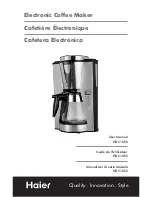
16
Clean
It is recommended that you clean the ice maker when the
“Cleaning Needed” light is illuminated or 9 months has elapsed
or ice production decreases significantly. To clean your ice maker,
see “Ice Maker System” in the “Cleaning” section.
Door Ajar Alarm
The Door Ajar Alarm feature sounds an alarm when the ice maker
door is open for 5 minutes. The alarm will repeat every 2 minutes.
Close the door to turn off. The feature then resets and will
reactivate when the door is left open again for 5 minutes.
Normal Sounds
Your new ice maker may make sounds that are not familiar to
you. Because the sounds are new to you, you might be
concerned about them. Most of the new sounds are normal. Hard
surfaces such as floors, walls and cabinets can make the sounds
seem louder than they actually are. The following describes the
kinds of sounds that might be new to you and what may be
making them.
■
You will hear a buzzing sound when the water valve opens to
fill the water pan for each cycle.
■
Rattling noises may come from the flow of the refrigerant or
the water line. Items stored on top of the ice maker can also
make noises.
■
The high-efficiency compressor may make a pulsating or high
pitched sound.
■
Water running over the evaporator plate may make a
splashing sound.
■
Water running from the evaporator plate to the water pan may
make a splashing sound.
■
As each cycle ends, you may hear a gurgling sound due to
the refrigerant flowing in your ice maker.
■
You may hear air being forced over the condenser by the
condenser fan.
■
During the harvest cycle, you may hear a “thud” when the ice
sheet slides from the evaporator onto the cutter grid.
■
When you first start the ice maker, you may hear water
running continuously. The ice maker is programmed to run a
rinse cycle before it begins to make ice.
■
If the ice maker is connected to a water supply pressure in
excess of 60 psi, you may hear a loud sound during water
filling associated with the flow of water through the inlet
valve. Call a licensed, qualified plumber to determine the best
method to reduce the supply water pressure (50 psi is
recommended).
ICE MAKER CARE
Cleaning
The ice making system and the air cooled condenser need to be
cleaned regularly for the ice maker to operate at peak efficiency
and to avoid premature failure of system components. See the
“Ice Maker System” and the “Condenser” sections.
Exterior Surfaces
Wash the exterior enamel surfaces and gaskets with warm water
and mild soap or detergent. Wipe and dry. Regular use of a good
household appliance cleaner and wax will help maintain the
finish. Do not use abrasive cleaners on enamel surfaces as they
may scratch the finish.
For products with a stainless steel exterior, use a clean sponge or
soft cloth and a mild detergent in warm water. Do not use
abrasive or harsh cleaners. Do not use chlorine bleach on the
stainless steel surfaces.
Ice Maker System
Minerals that are removed from water during the freezing cycle
will eventually form a hard scaly deposit in the water system.
Cleaning the system regularly helps remove the mineral scale
buildup. How often you need to clean the system depends upon
how hard your water is. With hard water of 15 to 20 grains/gal.
(4 to 5 grains/liter), you may need to clean the system as often as
every 9 months.
NOTE: Use one 16 oz (473 mL) bottle of approved ice maker
cleaner. To order, see “Accessories.”
1. Press the ON/OFF button.
2. Wait 5 to 10 minutes for the ice to fall into the storage bin.
Remove all ice from the storage bin.
3. Unscrew the drain cap from the bottom of the water pan
located inside the storage bin as shown. Allow the water to
drain completely.
4. Replace the drain cap securely on the water pan. If the drain
cap is loose, water will empty from the water pan and you will
have either thin ice or no ice.
5. Read and follow all handling information on the cleaner bottle
before completing the steps below. Use one 16 oz (473 mL)
bottle of approved ice maker cleaner.
6. Pour one bottle of solution into the water pan. Fill the bottle
twice with tap water and pour it into the water pan.
7. Press the CLEAN button. See “Using the Controls.” The
Clean button will blink, indicating that the cleaning cycle is in
process. When the “Cleaning Complete” light is illuminated
(approximately 70 minutes), the cleaning cycle is complete.
During the cleaning cycle, the system will both clean and
rinse itself.
A. Water pan
B. Drain cap
A
B
















































